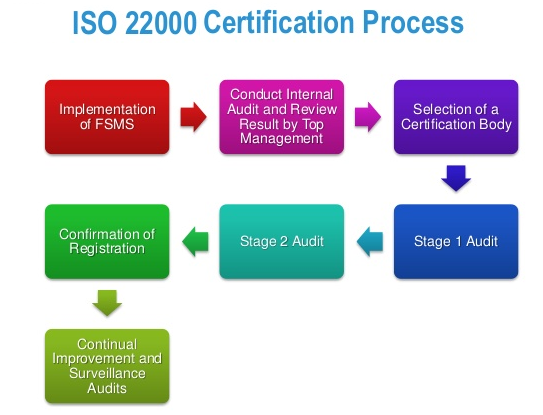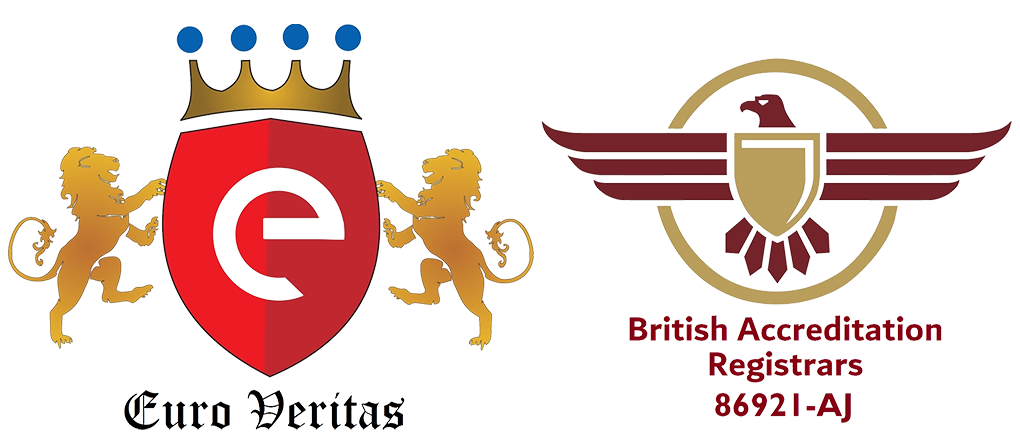Food safety management systems — Requirements
ISO 22000:2018 is an International Standard published from ISO for Food Safety Management System and specifies requirements for a food safety management system (FSMS) to enable an organization that is directly or indirectly involved in the food chain:
a) to plan, implement, operate, maintain and update a FSMS providing products and services that are safe, in accordance with their intended use;
b) to demonstrate compliance with applicable statutory and regulatory food safety requirements;
c) to do a food safety risk assessment and evaluate and assess mutually agreed customer food safety requirements and to demonstrate conformity with them;
d) to effectively communicate food safety issues to interested parties within the food chain;
e) to ensure that the organization conforms to its stated food safety policy;
f) to demonstrate conformity to relevant interested parties;
g) to seek certification or registration of its FSMS by [Euro Veritas, UK (www.euroveritas.com) accreditated from BAR-UK].
All requirements of ISO 22000:2018 are generic (this means that all clauses and requirements of this standard are applicable and there are no exclusions possible)- and are intended to be applicable to all kinds of organizations in the food chain, regardless of size and complexity.
Organizations that are directly or indirectly involved and who can implement and get certified from Euro Veritas, UK (www.euroveritas.com) accreditated from BAR-UK include, but are not limited to, feed producers, animal food producers, harvesters of wild plants and animals, farmers, producers of ingredients, food manufacturers, retailers, and organizations providing food services, catering services, cleaning and sanitation services, transportation, storage and distribution services, suppliers of equipment, cleaning and disinfectants, packaging materials and other food contact materials.
The ISO 22000:2018 standard allows any organization, including Corporates or small and/or less developed organizations (e.g. a small farm, a small packer-distributor, a small retail or food service outlet), Government or non-Government of Non-Profit organizations to implement externally-developed elements in their FSMS and get certified from Euro Veritas, UK (www.euroveritas.com) accreditated from BAR-UK.
Whatever their size, number of locations, or product / service type, all food processing companies / producers have an overall responsibility to manage the safety of their products and the well-being of their consumers. That’s why ISO 22000 exists and this is why organizations should get certified for ISO 22000:2018 from Euro Veritas, UK (www.euroveritas.com) accreditated from BAR-UK.
The Organizations should actually implement the ISO 22000 standard before they should approach and get themselves certified from Euro Veritas, UK (www.euroveritas.com) accreditated from BAR-UK. Because the consequences of unsafe food can be serious. ISO’s food safety management standards help organizations identify and control food safety hazards, at the same time as working together with other ISO management standards, such as ISO 9001. Applicable to all types of producer, ISO 22000 certification from Euro Veritas, UK (www.euroveritas.com) accreditated from BAR-UK provides reassurance within the global food supply chain, helping products cross borders and bringing people food that they can trust.
ISO 22000:2018 sets out the requirements for a food safety management system and can be certified to it. It maps out what an organization needs to do to demonstrate its ability to control food safety hazards in order to ensure that food is safe. It can be used by any organization regardless of its size or position in the food chain.
Who needs ISO 22000 Certification? From Euro Veritas, UK (www.euroveritas.com) accreditated from BAR-UK:
This standard can be applied to any company in the food chain, including growers, transporters, packagers, storage companies, processors, retailers, bottlers and restaurants.
How does a company achieve ISO 22000 certification? Euro Veritas, UK (www.euroveritas.com) accreditated from BAR-UK:
Once you have decided that ISO 22000 is required for your company, you will need to document and implement food safety management system processes to meet the requirements of the standard. These requirements are additional to only PRPs and HACCP and incorporate processes to manage the system throughout the organization. This means planning, designing, documenting and implementing a comprehensive system of food safety management.
It can take organizations 2 - 3 months or more to complete the documentation and implementation and trainings / awareness in their organization. Once the system is in place and being used as part of day to day business you will have Euro Veritas, UK (www.euroveritas.com) accreditated from BAR-UK come and perform a Certification Audit. If the auditor finds that the system is compliant with the standard and is being followed throughout the organization, we at Euro Veritas, UK (www.euroveritas.com) accreditated from BAR-UK will recommend your facility for certification.
ISO 22000:2018 can be used by any organisation within the food supply chain. The standard integrates the principles of a Hazard Analysis and Critical Control Point (HACCP) system developed by the Codex Alimentarius Commission and the Euro Veritas, UK Standard- EVL/HACCP/C-A/3788/C-6. By means of auditable requirements, it combines the HACCP plan with prerequisite programs as well as other food safety system requirements.
Euro Veritas, UK (www.euroveritas.com) accreditated from BAR-UK provides globally accredited certification for ISO 22000:2018 across a wide range of food chain industry types. These include food manufacturing, feed production, storage and distribution or the production of packaging and packaging material.
Benefits from ISO 22000:2018 implementation and certification from Euro Veritas, UK (www.euroveritas.com) accreditated from BAR-UK could result in:
• Improvement of Company ‘s reputation in the Food Chain.
• Market Rapport.
• Better Understanding of Food Safety Risks and Opportunities
• Improved management and communication.
• Assurances on quality, reliability and safety.
• Decrease costs from withdrawals or recalls.
• Improved reputation and brand loyalty.
• More confidence in disclosures.
• Less food borne diseases.
• Better quality and safer jobs in the food industry.
• Better utilization of resources.
• More efficient food safety hazard control.
• Systematic management of prerequisite programs.
• Valid basis for taking decisions.
• Control focused on priorities.
• Saves resources by reducing duplication.
• Better planning, less post-process verification.
• Development of a food safety management system.
• Increase the profits
• Control and eliminate food safety risks
• Continually improve the processes needed to provide safe food
• Built customer’s confidence on your ability to control any food safety hazards
• Ensure sustainable food safety
• Promote international trade

Is ISO 22000 certification right for me?
ISO 22000 certification is applicable to any organization within the food chain, regardless of size, from feed producers, primary producers through food manufacturers, transport and storage operators and subcontractors to retail and food outlets.
The standard may be applied to inter-related organizations such as producers of equipment, packaging material, cleaning agents, additives and ingredients. It may be applied to service providers. Part or all of the ISO 22000 certification requirements will apply to any products that contact the food industry or the food chain.
Why implement an ISO 22000 system?
The development of a FSMS by ISO, in the form of ISO 22000 represents a “proactive”, systematic and logical approach to address the problems of food safety.
The structure of the standard closely resembles that of existing International Standards- High Level Structure- Annex SL or Annex L. It is intended that this common approach will enable organizations that integrate a single management system that meets the requirements of two or more other management system standards (ISO 9001, ISO 14001, ISO 27001, ISO 45001 and ISO 22301).
This standard and the certification to it benefits your organization, it provides greater transparency, thanks to minimizing the main food risks, on one hand, while providing greater security to both customers and the end consumer, on the other.
Difference between HACCP and ISO 22000
Besides the fact that HACCP is a food safety system, and ISO 22000 is a food safety management system standard, differences between these two include the following:
• HACCP is only about developing an HACCP plan and implementing the same. ISO 22000:2018 contains one of the sub-clauses as HACCP.
• ISO 22000:2018 basically requires organizations to conduct a Food Safety Risk / Opportunity Assessment and identify and implement Operational Controls based on this in the form of various PRPs, OPRPs, OPs, SOPs etc.
• ISO 22000 allows the development of a food safety management system by external experts for any company, and this includes implementation and verification of all or part of activities involved in the system.
• ISO 22000 also refers to good practices in sectors and general hygiene rules.
• Besides the internal communication, external communication is also a condition for establishing, implementing and updating the FSMS according to ISO 22000.
• ISO 22000 demands risk analysis to evaluate each food safety hazards identified.
• ISO 22000 demands documentation of PRPs.
• HACCP uses the traditional concept of dividing control measures into two groups: prerequisites and measures applied at critical control points (CCPs). In the case of ISO 22000, these concepts are reorganized in a logical order by adding a group of control measures named operational prerequisite programs (oPRPs).
• ISO 22000 demands monitoring system and planning of corrective actions for operational PRPs, as for CCPs.
• ISO 22000 demands analysis and improvement according to the outcome of monitoring of oPRPs and HACCP plan.
• ISO 22000 also requires the review and identification of specifications, formulation and origin for input and end-products.
• ISO 22000 separates and clarifies verification activities and validation activities.
• Allergen control is a required prerequisite program in ISO 22000; however it is not mentioned in HACCP.
• ISO 22000, new terms have been developed, such as “potentially unsafe product” and the term “withdrawal” for product recall and product recollection activities.
• ISO 22000 requires continual improvement and updating of the management system.
Benefits to ISO 22000 certification for your organization- from Euro Veritas, UK (www.euroveritas.com) accreditated from BAR-UK
• Demonstrates your ongoing commitment to food safety
• Proves your integrity to the market
• Enhances consumer confidence in your brand
Euro Veritas, UK (www.euroveritas.com) accreditated from BAR-UK is an accredited ISO certification body and our food safety experts have the knowledge and experience to guide you successfully through the entire certification process. Our ISO 22000 services include training and pre-audit assessment as well. We also offer ongoing support through follow-up audits and certification renewal. Our expert food safety auditors can work with you to guarantee your products are produced, prepared, packaged, distributed and certified to the highest standards of food safety.



